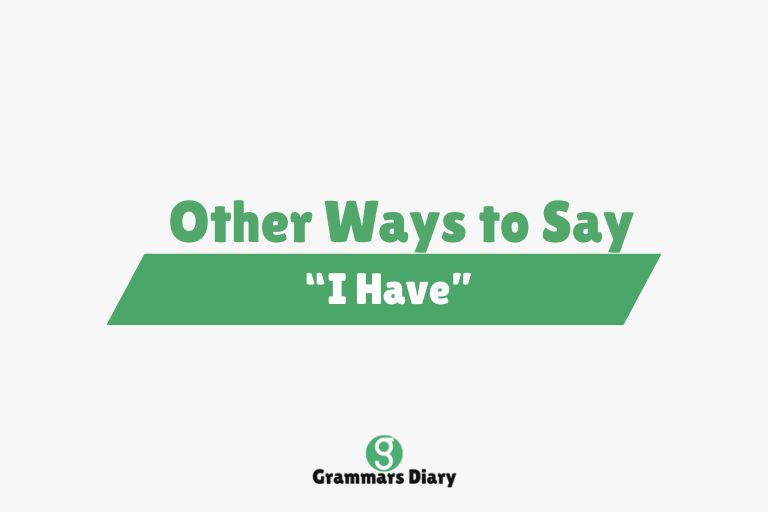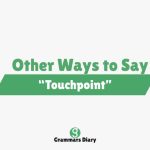“I have” is one of the most frequently used phrases in the English language, functioning as a personal declaration of possession, experience, or responsibility. Whether you’re stating something simple like “I have a pen” or something more abstract like “I have an idea,” this phrase appears in almost every form of communication—from daily conversations to professional emails.
But just like any frequently used phrase, “I have” can start to feel repetitive. Fortunately, there are many alternatives available, each offering a slightly different nuance or emotional tone. Whether you’re trying to sound more formal, more casual, or just want to vary your vocabulary, this guide will help you find the right substitute.
Other Ways to Say “I Have”
1. I possess
Example: “I possess the necessary qualifications for the job.”
Meaning: To own or hold something formally or officially.
Usage: Common in professional and academic contexts where a more authoritative or serious tone is required.
2. I own
Example: “I own a small house near the lake.”
Meaning: To legally or personally have something as property.
Usage: Best used when referring to tangible items or legal ownership.
3. I hold
Example: “I hold a degree in mechanical engineering.”
Meaning: To have something such as a position, title, or qualification.
Usage: Often used in job applications, résumés, or formal bios.
4. I carry
Example: “I carry my ID card at all times.”
Meaning: To physically have something on you.
Usage: Useful for describing physical items you’re currently bearing.
5. I’m in possession of
Example: “I’m in possession of the documents you requested.”
Meaning: A formal way of saying you currently have something.
Usage: More common in legal or formal communications.
6. I’ve got
Example: “I’ve got a few minutes to talk.”
Meaning: An informal alternative to “I have.”
Usage: Widely used in casual speech, especially in British and American English.
7. I experience
Example: “I experience anxiety before public speaking.”
Meaning: Used for emotions, sensations, or intangible experiences.
Usage: Suitable for both casual and reflective discussions.
8. I enjoy
Example: “I enjoy good coffee in the morning.”
Meaning: Implies both possession and appreciation of something.
Usage: Works well in personal or lifestyle-related contexts.
9. I harbor
Example: “I harbor resentment toward my former employer.”
Meaning: To keep emotions or thoughts internally, often negative ones.
Usage: Typically used in introspective or serious writing.
10. I maintain
Example: “I maintain a close relationship with my mentors.”
Meaning: Suggests continued possession or management of something.
Usage: Often used in professional or ongoing personal relationships.
11. I keep
Example: “I keep a notebook for all my creative ideas.”
Meaning: To retain or hold onto something regularly.
Usage: Suitable for both physical and abstract possessions.
12. I come with
Example: “I come with years of industry experience.”
Meaning: A unique phrasing that frames the speaker as offering something.
Usage: Frequently used in resumes or sales-oriented communication.
13. I’ve been given
Example: “I’ve been given a second chance to prove myself.”
Meaning: Indicates that something was granted to you.
Usage: Best for emotional, personal, or narrative contexts.
14. I was born with
Example: “I was born with a strong sense of curiosity.”
Meaning: Describes something innate or naturally possessed from birth.
Usage: Common in autobiographies or personal development topics.
15. I am blessed with
Example: “I am blessed with supportive friends and family.”
Meaning: A gracious and often spiritual way to express possession.
Usage: Suitable in emotional or reflective writing.
16. I am equipped with
Example: “I am equipped with the knowledge and tools to complete this task.”
Meaning: Implies readiness or possession of necessary resources or skills.
Usage: Common in professional, technical, or motivational contexts.
17. I am fortunate to have
Example: “I am fortunate to have mentors who guide me.”
Meaning: Expresses gratitude for something one possesses.
Usage: Frequently used in reflective or appreciative contexts.
18. I am the holder of
Example: “I am the holder of multiple certifications in digital marketing.”
Meaning: A formal way to declare possession, particularly of titles or credentials.
Usage: Suitable in academic or career-related statements.
19. I’ve obtained
Example: “I’ve obtained a permit to start my business.”
Meaning: Highlights acquisition, especially through effort or process.
Usage: Often used when discussing achievements or formal acquisitions.
20. I’ve acquired
Example: “I’ve acquired new skills over the past year.”
Meaning: Indicates something gained through learning or experience.
Usage: Common in resumes, bios, or personal growth discussions.
21. I’ve earned
Example: “I’ve earned the respect of my colleagues.”
Meaning: Signifies possession through merit or effort.
Usage: Useful in personal success or accomplishment contexts.
22. I am responsible for
Example: “I am responsible for the team’s performance.”
Meaning: Signifies ownership through duty or accountability.
Usage: Common in work-related or leadership situations.
23. I possess ownership of
Example: “I possess ownership of several investment properties.”
Meaning: A very formal phrase, often used in legal or financial contexts.
Usage: Appropriate when discussing legal rights or asset control.
24. I’ve been awarded
Example: “I’ve been awarded a scholarship for academic excellence.”
Meaning: Indicates receipt of something through recognition or honor.
Usage: Often seen in academic, professional, or ceremonial contexts.
25. I claim
Example: “I claim full responsibility for the project’s outcome.”
Meaning: To assert possession, right, or responsibility.
Usage: Strong in tone, useful in formal or assertive communication.
26. I retain
Example: “I retain the right to revise the agreement.”
Meaning: To continue to have or hold onto something.
Usage: Suitable in legal, formal, or structured scenarios.
27. I’ve inherited
Example: “I’ve inherited a love of music from my parents.”
Meaning: To receive something, typically from family or legacy.
Usage: Common in familial, emotional, or cultural discussions.
When to Use Different “I Have” Alternatives
In Professional Settings
When writing a resume, email, or proposal, opting for more formal variations such as I hold, I’ve obtained, I possess, or I maintain can make your tone more authoritative and polished. These phrases suggest responsibility, credibility, and competence.
In Everyday Conversations
In casual dialogue, expressions like I’ve got, I keep, or I enjoy flow more naturally and help maintain a relaxed and relatable tone. These forms are quick, friendly, and perfectly suited for daily exchanges or informal writing.
In Academic or Reflective Writing
For essays, reflections, or personal development writing, options like I’ve acquired, I was born with, I harbor, or I am blessed with offer deeper emotional or intellectual nuance. These choices show self-awareness and a mature tone.
Conclusion
While “I have” remains a foundational phrase in English, expanding your vocabulary with alternative expressions not only enriches your communication but also allows you to adapt your tone to various situations—be it formal, casual, personal, or academic. Each variation brings its own subtle meaning and emotional layer, helping you express yourself more clearly and powerfully.
As with any language tool, the key is knowing when and how to use each expression. With this guide, you’re now better equipped to replace “I have” with confidence and purpose.
FAQs
What does “I have” mean?
“I have” generally indicates possession, experience, or responsibility over something—whether tangible or abstract.
Is “I have” formal or informal?
“I have” is neutral and can be used in both formal and informal settings. However, alternatives like “I possess” or “I’ve got” may shift the tone.
Can “I have” and “I’ve got” be used interchangeably?
Yes, in most casual conversations, “I’ve got” works in place of “I have,” although “I have” is more appropriate in formal writing.
When should I avoid saying “I have”?
If you’re writing for a resume, research paper, or professional email, consider using more specific or nuanced alternatives that better match the formality of the situation.











